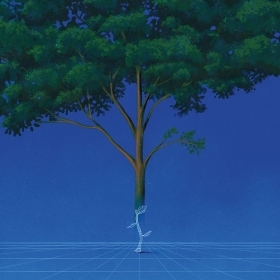Photo by Richard Howard
This summer, Associate Professor of Environmental Studies Jay Turner and his wife took their three young sons hiking in the deep wilderness in Wyoming’s Wind River Range—with two rented llamas to carry their backpacks. But Turner is reluctant to connect his career as a scholar of environmentalism to his love for nature and concern for parklands—as profound as that is.
“When I think of what matters in terms of environment, it’s not the outdoors. It’s not national parks. It’s air pollution and water pollution and issues of environment and public health,” he says. “In terms of what’s at stake now, it’s not just the outdoors—it’s our health.”
Turner, who earned his Ph.D. in the history of science at Princeton, came to Wellesley in 2006. “Much of my teaching here has been on issues of environmental policy and public health, and a good bit on climate change as well,” he says. His popular introductory course in environmental studies is an entryway for many students to a more sophisticated understanding of the forces at play around these issues.
Turner says the first Earth Day—April 22, 1970, which is considered the spark that lit the modern environmental movement—was born from worry not for the nation’s forests and parks, but for its cities. “People were concerned about rivers that were on fire, and the fact that you could not see skyscrapers in Los Angeles through the smog. Yet many people still say, ‘Well, really, the movement was most concerned about parks and outdoor areas.’ It’s such a deep-set notion in how we think about what is ‘environmental,’ even if our history has been about something very different.”
He cites what he calls two “origin strands” of modern environmentalism and environmental policy. “One is that story about the [concern for] parks and wilderness. The other one is Rachel Carson’s Silent Spring, which was about DDT and the health and survival of birds—but was also about children, about families, and to an extent about farm workers, all of whom were suffering the consequences of using chemicals. Eventually, it becomes about environmental justice.”
Turner says he has seen Wellesley students evolve in their attitude to matters of the environment. “There has been growing, strong interest in issues of race, environment, and environmental justice, which is not abating,” he says. “There has been growing interest in issues of food, agriculture, and sustainability, and interest in climate and clean energy has been building as well.”
In an era when government is turning away from environmental protections and leaders disbelieve the science around climate change, staying in the fight can be tough. “This is scary stuff,” says Turner.
After the election in November 2016, he and a colleague, Andrew Isenberg, an environmental historian at Temple University, embarked on a new project.
“I literally took the project that I had been working on and put it on a shelf when I realized that Trump was coming into office,” Turner says. “He was saying all of these crazy things about how he was going to dismantle the Environmental Protection Agency and eliminate our environmental and public-health laws. I realized that we’d actually heard crazy things like this before. Ronald Reagan, George W. Bush, Newt Gingrich, all along the way had crazy things to say and crazy plans to roll back environmental protections. I realized that now more than ever, we need to know how the environmental movement resisted those efforts and what lessons we can draw as we’re facing those attacks on an even greater level.”
The result of their work is a book, provisionally titled Republican Reversal: Conservatives and the Environment from Reagan to Trump, which comes out from Harvard University Press next year.
“To be a Republican has not always meant opposing environmental protection,” says Turner. He explains that Republicans have a long tradition of environmental protection: Richard Nixon created the Environmental Protection Agency and signed the Clean Water Act; moderate Republicans safeguarded and supported the Clean Air Act and Clean Water Act.
“The ‘Republican reversal’ in our title is the retreat from the earlier, more moderate, Republican commitment to environmental protection,” Turner says.
Despite current threats, Turner remains optimistic that long-term environmental protections enshrined in law will weather this period of history. He says, “I think the Trump administration may well learn a lesson that Ronald Reagan and Newt Gingrich and George W. Bush all learned the hard way before him, which is that when push comes to shove, people like clean air and clean water.”







We ask that those who engage in Wellesley magazine's online community act with honesty, integrity, and respect. (Remember the honor code, alums?) We reserve the right to remove comments by impersonators or comments that are not civil and relevant to the subject at hand. By posting here, you are permitting Wellesley magazine to edit and republish your comment in all media. Please remember that all posts are public.